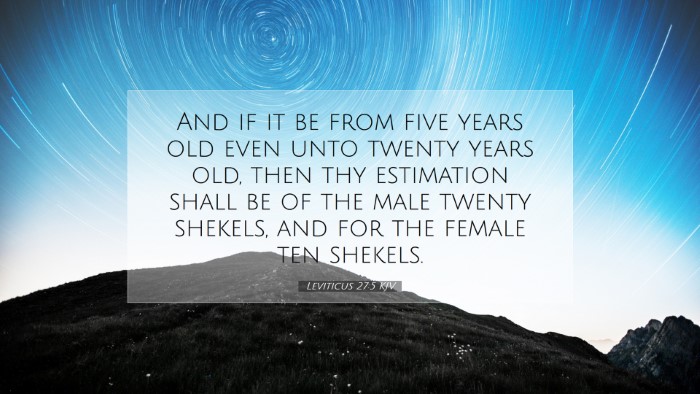Commentary on Leviticus 27:5
Verse Text: Leviticus 27:5 - "And if it be a female, then thy estimation shall be thirty shekels."
Introduction
The verse from Leviticus 27:5 comes from the concluding part of the book of Leviticus, which deals with the principles of holiness and the laws governing various offerings and valuations. This section specifically addresses the value assigned to individuals dedicated to the Lord, with a focus on gender distinctions in valuation.
Contextual Background
This chapter provides guidelines for the valuation of persons dedicated to God, illustrating the deeper theological implications of commitment to the Lord. The verses leading up to Leviticus 27:5 discuss how different age groups are to be assessed, emphasizing that such valuations are both significant in the social context and reflective of the general understanding of gender roles within ancient Israel.
Key Insights from Commentaries
Matthew Henry's Commentary
Matthew Henry highlights the principle of valuation as a reflection of a person's worth in terms of service to God. In his exposition of Leviticus 27:5, he notes:
- Gender Distinction: Henry observes that the valuation of individuals varies based on gender, which invites consideration of societal roles. The estimation of a female at thirty shekels signifies a differentiated yet valued role in the community.
- Symbolic Significance: He articulates that the specific valuation can symbolize how individuals contribute differently to religious life, suggesting that both men and women have unique spiritual offerings.
- Divine Ownership: The larger context of the chapter reveals that all valuations and dedications are ultimately to God, reminding believers of their stewardship over life and possessions.
Albert Barnes' Notes
Albert Barnes provides a detailed analysis that emphasizes the valuation system as reflective of social and economic realities of the time:
- Economic Implications: Barnes points out that the thirty shekels denotes a practical approach to valuation under Mosaic Law, which aligns with economic principles and personal worth within the community.
- Interpretation of Shekels: The mention of thirty shekels also connects to Biblical symbolism, as it is the same amount associated with the betrayal of Jesus (Matthew 26:15), suggesting deeper layers of meaning regarding value.
- Community Dynamics: Within Barnes' observations is an understanding of how the community dynamics function through these valuations, revealing a system where both contributions of men and women are recognized but highlighted differently.
Adam Clarke's Commentary
Adam Clarke adds to the understanding of this verse by elaborating on the cultural contexts and broader implications:
- Cultural Significance: Clarke notes that the valuation being set for a female, at a lower figure than that for males, reflects not only an ancient cultural norm but also a divine order that was established for reasons beyond mere human reasoning.
- Spiritual Lessons: He argues that spiritual lessons can be derived from the valuations, including the importance of recognizing the worth that God places not only on genders but upon every individual's call for earthly and spiritual service.
- Value in Dedication: Clarke emphasizes that regardless of the set value, the act of dedication to God is paramount, as God sees the heart, underscoring the critical aspect of devotion over monetary figures.
Theological Implications
In light of the insights provided by the commentaries, several theological implications arise from Leviticus 27:5:
- Recognition of Gender Roles: The differing valuations reflect ongoing theological discussions regarding the roles of women in religious life and serve as a point of reflection on how gender dynamics have evolved within Church practices.
- The Concept of Value: The monetary valuation reminds the faithful that worth is not merely an economic concept but also tied to one's commitment to God, thus shifting focus from external appraisals to internal spiritual worth.
- Dedicating the Whole Self: The process of valuation ultimately reinforces the idea that all dedication, regardless of the estimated worth, is significant in God's economy, highlighting a broader call to service and sacrificial living.
Conclusion
Leviticus 27:5 serves as a profound verse that contributes to understanding assured through biblical valuation systems. As delineated in the commentaries by Matthew Henry, Albert Barnes, and Adam Clarke, this verse is not merely a legal stipulation but encapsulates rich theological insight into dedication, personal worth, and divine appreciation of service. It challenges contemporary believers to consider the implications of their own valuations and commitments in the light of God's eternal purposes.


